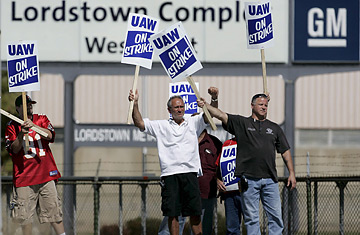
United Auto Workers members Jason Connolly, Ralph Marinucci and Jim Ferrante picket General Motor Corp's assembly plant in Lordstown, Ohio, September 24, 2007.
For the first time since 1970, the United Auto Workers has launched a nationwide strike against General Motors Corp. The labor stoppage, involving more than 73,000 union members, began at 11 a.m. on Monday after GM and the UAW failed to reach an accord on a contract that could potentially lead to sweeping changes in the financing of health care for retired workers.
But health care did not appear to be the immediate cause of the snag in negotiations. The strike was prompted by GM's prospective production plans, particularly the construction of a new assembly plant in Mexico that could be ready to export vehicles to the U.S. in about one year. Surprised union members cited job security as the key issue as they walked out of GM assembly plants around Detroit. "They just told us we were going on strike and it was about job security," said one member of UAW Local 594 in Pontiac, Mich. only moments after the strike began. In fact, UAW officials acknowledged that they had made scant preparation for the walkout until Monday morning.
Alan Baum, an analyst with the Planning Edge in Birmingham, Mich., said, that a strike over job security is likely to be the UAW's attempt to win concessions from GM in exchange for the union's acquiescence to parts of the health care financing agreement, embodied in the so-called Voluntary Employment Benefit Association (VEBA). "If the UAW its going to take the VEBA to its members," says Baum, "it has to have something to show for it. The issue then becomes, 'We gave here but this is what we got.'" Baum said the strike could well serve the interests of both the company and the union by demonstrating that they had pushed to the limit. "Both sides need to say they got all they could," he said.
For the moment, the official focus is job security. "It's about investment in new products and its about economic issues that affect our membership," said UAW President Ron Gettelfinger at a press conference at union headquarters in Detroit. Gettelfinger said talks would resume immediately, but after nearly 10 days of intense negotiations he did not sound optimistic about the prospects for a quick settlement. "It was going to be General Motors' way at the expense of the workers," Gettelfinger said. "The company walked right up to the deadline like they really didn't care." He added, "You can only be pushed so far. There comes a point where you have to draw the line." GM officials, meanwhile, said the talks involved complex issues and the company planned to "continue focusing our efforts on reaching an agreement as soon as possible." Union members said they were prepared for a long slog. "You can't look at it just for today," said another member as she signed up for picket duty. "If you do, you won't have a dime to retire on."
